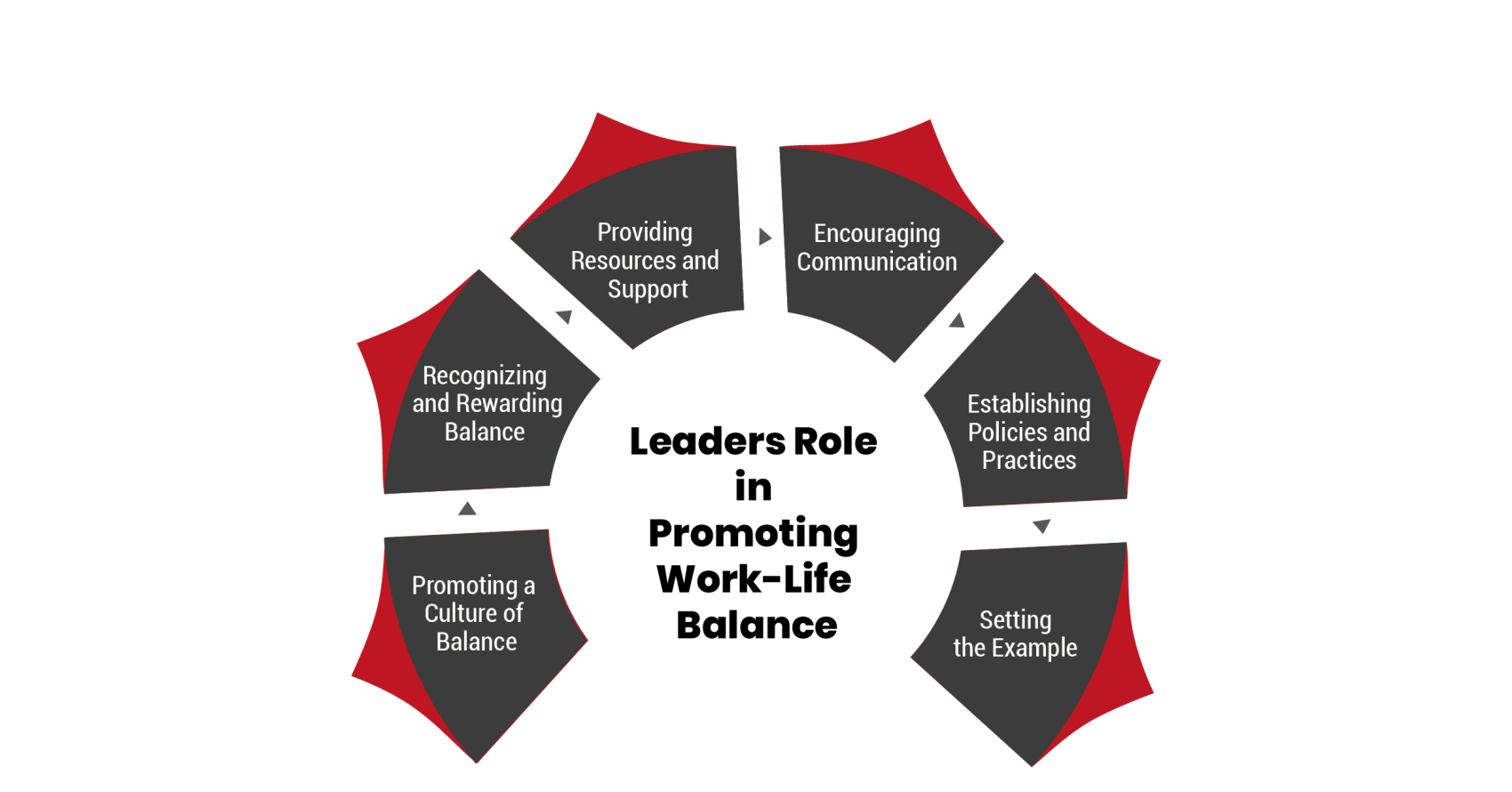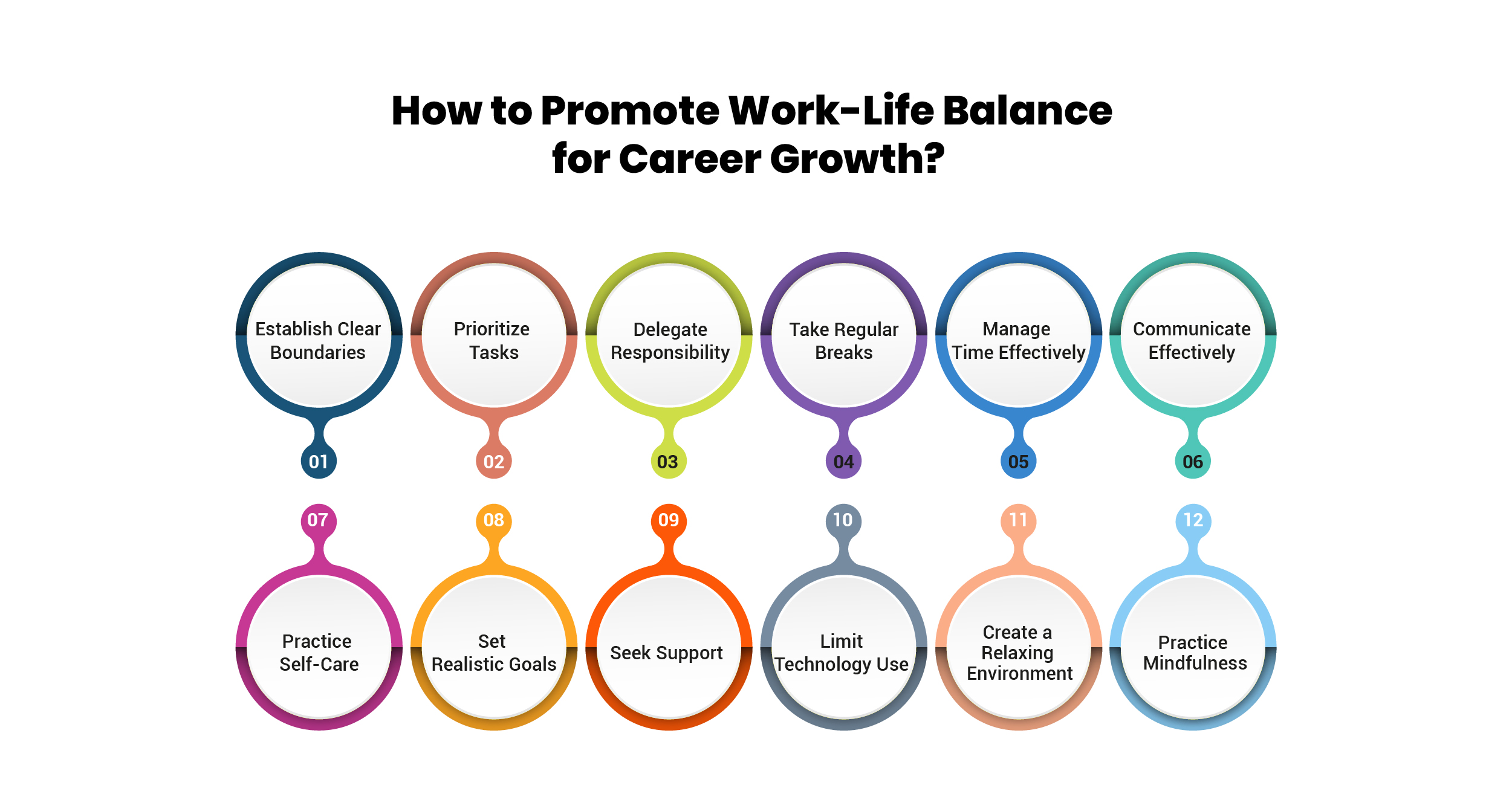In the hustle and bustle of modern life, finding a balance between work and personal life has become more challenging than ever. The concept of work-life balance involves more than just managing time between work and personal life; it encompasses creating a harmonious blend that allows individuals to excel in their careers while enjoying a fulfilling personal life.
Work-life balance is not a one-size-fits-all approach; it varies based on individual preferences and priorities. It's about finding the right equilibrium that enables individuals to meet their professional responsibilities without compromising their personal lives.
In this blog, we explore the significance of work-life balance for career growth, the role of leadership in promoting this balance, and practical strategies to achieve it.
Understanding Work-Life Balance
What is Work-Life Balance?
Work-life balance is the delicate equilibrium individuals seek to achieve between their professional responsibilities and personal pursuits. It is a dynamic state that allows individuals to manage their time effectively, making sure that neither their work nor personal life dominates at the expense of the other.
Contrary to a common misconception, achieving a work-life balance does not necessarily mean dividing time equally between work and personal life. Rather, it involves prioritizing and allocating time based on personal values and goals. According to the Randstand annual study, 57% of employees would not take a job that would interfere with their ability to balance work and life.
This balance is crucial for overall well-being and performance. It helps reduce stress, prevent burnout, and enhance productivity and job satisfaction. By setting boundaries, managing time wisely, and focusing on what truly matters, individuals can create a harmonious blend of work and personal life, leading to a more fulfilling and sustainable lifestyle.
Why is Work-Life Balance Important?
Work-life balance is not just a personal indulgence but a strategic necessity for individuals seeking to excel in their careers and lead fulfilling lives.
This equilibrium is vital for several reasons:
- Enhanced Well-being: Striking a balance between work and personal life is critical for maintaining good physical and mental health. It reduces stress, prevents burnout, and promotes overall well-being.
- Improved Productivity: Individuals who maintain a healthy work-life balance tend to be more productive. They can focus better, make clearer decisions, and deliver higher-quality work consistently.
- Stronger Relationships: Balancing work and personal life allow individuals to nurture their relationships with family and friends. This, in turn, leads to a stronger support network and greater overall happiness.
- Career Advancement: Work-life balance is not just about taking time off; it's also about investing in oneself. Engaging in hobbies and pursuing further education can enhance your skills, creativity, and resilience, ultimately leading to career growth.
- Increased Job Satisfaction: When individuals feel in control of their work-life balance, they are more satisfied with their jobs. This satisfaction translates into higher morale, lower turnover rates, and a more positive work environment.
Role of Leadership in Promoting Work-Life Balance
Effective leadership is paramount in fostering a work culture that prioritizes and promotes work-life balance among employees. Leaders can create a more productive, engaged, and satisfied workforce by setting an example, establishing supportive policies, and fostering a culture that values balance.
Leadership contributes to creating a balanced work environment in the following ways:

- Setting the Example
Leaders serve as role models for work-life balance. When leaders prioritize their own well-being and demonstrate a healthy balance between work and personal life, it sets a positive example for employees to follow.
- Establishing Policies and Practices
Leadership holds the power to establish policies and practices that support work-life balance. This can be done by offering flexible work arrangements, promoting a culture of taking a break/vacation and providing other important resources for employee well-being.
- Encouraging Communication
Effective leaders encourage open communication about work-life balance. They create an environment where employees feel comfortable discussing their needs and concerns. This leads to a more supportive workplace culture.
- Providing Resources and Support
Leaders can provide resources and support to help employees achieve work-life balance. This may include access to wellness programs, counseling services, or flexible scheduling options.
- Recognizing and Rewarding Balance
Leaders can recognize and reward employees who demonstrate a commitment to work-life balance. This can be done through performance evaluations, promotions, or other forms of recognition. This further helps in reinforcing the importance of balance within the organization.
- Promoting a Culture of Balance
Influential leaders are pivotal in cultivating a culture that prioritizes maintaining a balance between professional and personal life. They mainly achieve this by embedding this principle in the organization’s ethos. They also make sure that the established policies and practices support this commitment.
How to Promote Work-Life Balance for Career Growth?
Achieving a balance between your professional and personal life requires a deliberate and strategic approach. It is vital for both long-term career growth and overall well-being. By achieving this balance, you not only improve job satisfaction and productivity but also lay the groundwork for sustained career advancement.

- Establish Clear Boundaries
Setting clear boundaries helps you delineate between work and personal life. It ensures that work-related tasks don't encroach upon your personal time. This allows you to focus on both aspects of your life separately and effectively.
- Prioritize Tasks
Prioritizing tasks helps you focus on what's most important. By identifying and tackling high-priority tasks first, you can manage your workload more efficiently and ensure that critical tasks are completed on time.
- Delegate Responsibility
Delegating tasks allows you to distribute workload effectively. It enables you to assign tasks to team members who are best suited to handle them, freeing up your time to focus on tasks that require your expertise and attention.
- Take Regular Breaks
Taking breaks is essential for maintaining productivity and well-being. Regular breaks help you recharge and refocus, reducing stress and preventing burnout. They also improve overall productivity by allowing you to approach tasks with a fresh perspective.
- Manage Time Effectively
Effective time management is crucial for balancing work and personal life. It involves setting goals, prioritizing tasks, and using techniques like time blocking to allocate time to different activities. This makes sure that you make the most of your time and avoid procrastination.
- Communicate Effectively
Effective communication is key to managing work-life balance. It involves expressing your needs and boundaries clearly to your colleagues and supervisors. They should be able to understand your priorities and can support you in maintaining a healthy balance between work and personal life.
- Practice Self-Care
Self-care is essential for maintaining physical and mental well-being. It involves taking care of your health, getting enough rest, and engaging in activities that help you relax and recharge. This way, you are able to perform at your best both professionally and personally.
- Set Realistic Goals
Setting realistic goals helps you stay motivated and focused. By setting achievable goals, you can track your progress and celebrate your successes. This will boost your confidence and help you stay committed to achieving a healthy work-life balance.
- Seek Support
Seeking support from friends, family, or a professional counselor can help you navigate challenges and maintain balance. Having a support system can provide you with guidance, encouragement, and perspective, helping you manage stress and stay resilient.
- Limit Technology Use
Limiting your use of technology outside of work hours can help you disconnect and unwind. Setting boundaries for checking emails and messages can prevent work-related stress from spilling over into your personal life. This gives you time to relax and recharge.
- Create a Relaxing Environment
Creating a relaxing environment at home can help you unwind and relax. By creating a space that is conducive to relaxation, you can promote a sense of calm and well-being. This will ensure that you have a peaceful retreat from the demands of work.
- Practice Mindfulness
Mindfulness practices, such as meditation or yoga, can help you stay present and focused. By practicing mindfulness, you can reduce stress, improve your concentration, and enhance your overall well-being. This way, you are able to approach both work and personal life with clarity and purpose.
Final Words
Promoting work-life balance is essential for sustainable career growth and personal well-being. It's about creating a lifestyle that supports professional success without compromising personal fulfillment. By understanding the importance of work-life balance and implementing practical strategies, individuals can enhance job satisfaction, productivity, and overall quality of life.
Leadership plays a pivotal role in fostering a work culture that values work-life balance. Effective leaders set an example, establish supportive policies, and cultivate a culture that prioritizes well-being. This not only benefits employees but also contributes to a more productive and engaged workforce.
Achieving work-life balance requires commitment and effort. By prioritizing self-care, setting achievable goals, and seeking support when needed, individuals can create a balanced lifestyle that allows them to thrive both professionally and personally.

